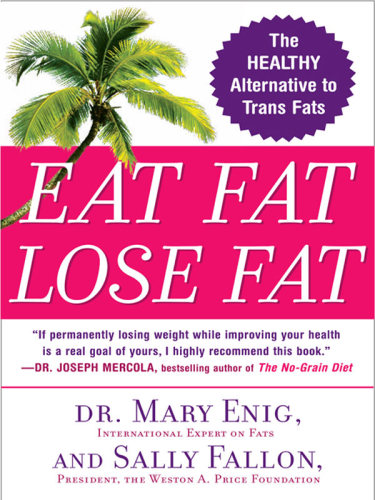
Eat Fat, Lose Fat
The Healthy Alternative to Trans Fats
کتاب های مرتبط
- اطلاعات
- نقد و بررسی
- دیدگاه کاربران
نقد و بررسی

January 1, 2005
In this new addition to the fast-fix diet book shelf, Enig and Fallon attempt to correct what they see as Americans' false belief that tropical fats and oils (such as coconut and palm) are unhealthy, asserting that those fats (and coconut, especially) are beneficial saturated fats that should be more heavily incorporated into our diets. Enig, a biochemist and nutritionist, along with Fallon, president of the Weston A. Price Foundation (a non-profit dedicated to helping people implement healthy approaches to nutrition), say "high-fat, low-carb really works," eschewing the disastrous effects a high-fat diet can have on a person's heart. They like the Atkins diet, but say it doesn't take advantage of the "metabolism-boosting" powers of coconut oil. Their approach skews more toward traditional diets and away from modern diets (e.g., chose animal fats over vegetable oils; raw or fermented dairy products instead of pasteurized ones). Though based on considerable research, the book is somewhat off-putting. Its emphasis on one ingredient-in the recipe section, for example, one sample menu has readers eating a dish with coconut in it seven times in one day-seems nutritionally suspicious.

January 17, 2005
In this new addition to the fast-fix diet book shelf, Enig and Fallon attempt to correct what they see as Americans' false belief that tropical fats and oils (such as coconut and palm) are unhealthy, asserting that those fats (and coconut, especially) are beneficial saturated fats that should be more heavily incorporated into our diets. Enig, a biochemist and nutritionist, along with Fallon, president of the Weston A. Price Foundation (a non-profit dedicated to helping people implement healthy approaches to nutrition), say "high-fat, low-carb really works," eschewing the disastrous effects a high-fat diet can have on a person's heart. They like the Atkins diet, but say it doesn't take advantage of the "metabolism-boosting" powers of coconut oil. Their approach skews more toward traditional diets and away from modern diets (e.g., chose animal fats over vegetable oils; raw or fermented dairy products instead of pasteurized ones). Though based on considerable research, the book is somewhat off-putting. Its emphasis on one ingredient-in the recipe section, for example, one sample menu has readers eating a dish with coconut in it seven times in one day-seems nutritionally suspicious.
Copyright 2005 Library Journal, LLC Used with permission.

























دیدگاه کاربران